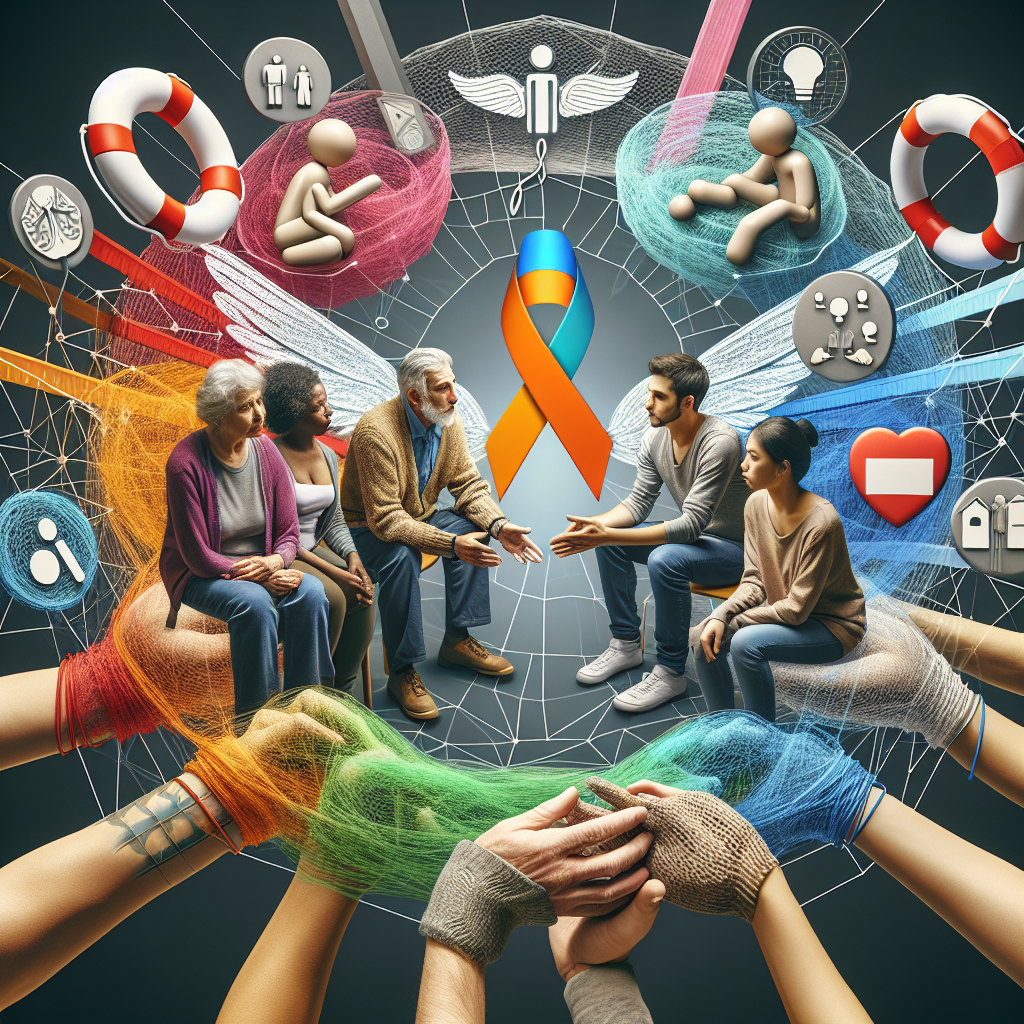-
Table of Contents
“Together We Heal: Building Bridges for Fentanyl Addiction Recovery”
Introduction

Creating a supportive network for fentanyl addiction recovery is crucial for individuals striving to overcome dependency and achieve long-term sobriety. This network, comprising family, friends, healthcare professionals, and support groups, provides emotional encouragement, practical assistance, and a sense of community. By fostering an environment of understanding and compassion, a supportive network helps individuals navigate the challenges of withdrawal, treatment, and reintegration into daily life. It also plays a vital role in reducing the stigma associated with addiction, promoting open communication, and ensuring access to necessary resources and services. Ultimately, a well-structured support system is instrumental in enhancing the recovery process and improving overall outcomes for those affected by fentanyl addiction.
Building Trust and Communication in Your Support Network
Creating a supportive network for fentanyl addiction recovery is a crucial step in the journey towards healing and long-term sobriety. Building trust and communication within this network can significantly enhance the recovery process, providing the necessary emotional and practical support to navigate the challenges of addiction. Establishing a foundation of trust begins with honesty and openness. For individuals in recovery, sharing their struggles and experiences candidly with their support network can foster a sense of understanding and empathy. This transparency encourages others to reciprocate, creating a safe space where everyone feels valued and heard.
Effective communication is the cornerstone of any supportive network. It involves not only expressing oneself clearly but also actively listening to others. Active listening means giving full attention to the speaker, acknowledging their feelings, and responding thoughtfully. This practice helps to build stronger connections and ensures that everyone in the network feels respected and validated. Moreover, it is essential to communicate with compassion and without judgment. Addiction is a complex and deeply personal issue, and approaching conversations with empathy can make a significant difference in how individuals feel supported.
In addition to fostering open communication, it is important to establish clear boundaries within the support network. Boundaries help to maintain healthy relationships and prevent burnout among those offering support. They ensure that everyone understands their roles and responsibilities, which can reduce misunderstandings and conflicts. Setting boundaries also allows individuals in recovery to take ownership of their journey, empowering them to make decisions and take actions that align with their goals.
Another key aspect of building trust and communication in a support network is consistency. Regular check-ins and ongoing support demonstrate commitment and reliability, which are vital for trust-building. Whether through scheduled meetings, phone calls, or text messages, consistent communication reassures individuals in recovery that they are not alone and that their support network is steadfast in their commitment to their well-being.
It is also beneficial to incorporate professional support into the network. Therapists, counselors, and addiction specialists can provide expert guidance and resources that complement the emotional support from friends and family. These professionals can offer strategies for coping with cravings, managing stress, and addressing underlying issues that may contribute to addiction. By integrating professional help, the support network becomes more robust and comprehensive, addressing both the emotional and practical aspects of recovery.
Furthermore, celebrating milestones and achievements, no matter how small, can strengthen the bonds within the support network. Acknowledging progress reinforces positive behavior and motivates individuals to continue their recovery journey. It also provides an opportunity for the support network to come together and share in the joy of these accomplishments, fostering a sense of community and collective effort.
In conclusion, creating a supportive network for fentanyl addiction recovery involves building trust and communication through honesty, active listening, compassion, and consistency. Establishing clear boundaries and incorporating professional support can enhance the effectiveness of the network, providing a well-rounded foundation for recovery. Celebrating milestones further strengthens these bonds, creating a resilient and encouraging environment. By prioritizing these elements, individuals in recovery can feel empowered and supported, paving the way for a successful and sustainable journey towards sobriety.
The Role of Family and Friends in Fentanyl Addiction Recovery
Creating a supportive network for fentanyl addiction recovery is crucial for individuals striving to overcome this powerful and often devastating addiction. The role of family and friends in this journey cannot be overstated, as their involvement can significantly influence the recovery process. Understanding the importance of a supportive network begins with recognizing the profound impact that addiction has not only on the individual but also on their loved ones.
Fentanyl addiction is a complex and multifaceted issue that affects the brain’s chemistry, leading to intense cravings and withdrawal symptoms. For those battling this addiction, the path to recovery can be fraught with challenges. However, having a strong support system can provide the encouragement and stability needed to navigate these difficulties. Family and friends play a pivotal role in offering emotional support, practical assistance, and a sense of belonging, all of which are essential components of a successful recovery.
One of the most significant ways family and friends can support a loved one in recovery is by fostering an environment of understanding and empathy. Addiction often carries a stigma that can lead to feelings of shame and isolation. By approaching the situation with compassion and without judgment, loved ones can help reduce these negative emotions and create a safe space for open communication. This supportive atmosphere allows the individual to express their struggles and fears, which is a critical step in the healing process.
In addition to emotional support, practical assistance is also vital. This can include helping the individual find and access treatment programs, attending therapy sessions together, or assisting with daily responsibilities that may become overwhelming during recovery. By sharing these burdens, family and friends can alleviate some of the stress and pressure that might otherwise hinder progress. Moreover, being actively involved in the recovery process demonstrates a commitment to the individual’s well-being, reinforcing their motivation to stay on the path to sobriety.
Another crucial aspect of supporting a loved one in fentanyl addiction recovery is education. Understanding the nature of addiction, the effects of fentanyl, and the recovery process can empower family and friends to provide more effective support. This knowledge can also help them recognize the signs of relapse and take appropriate action if necessary. By staying informed, loved ones can better navigate the complexities of addiction and recovery, ultimately contributing to a more positive outcome.
Furthermore, encouraging healthy lifestyle changes can significantly impact the recovery journey. Family and friends can promote activities that support physical and mental well-being, such as regular exercise, balanced nutrition, and mindfulness practices. These activities can help reduce stress, improve mood, and enhance overall health, making it easier for the individual to maintain their sobriety. Additionally, participating in these activities together can strengthen the bond between the individual and their support network, providing a sense of unity and shared purpose.
Lastly, it is essential for family and friends to take care of their own well-being. Supporting someone through addiction recovery can be emotionally taxing, and it is crucial to seek support for themselves as well. This might involve joining support groups, seeking therapy, or simply taking time for self-care. By maintaining their own health and resilience, loved ones can continue to provide the necessary support without becoming overwhelmed or burnt out.
In conclusion, the role of family and friends in fentanyl addiction recovery is multifaceted and deeply impactful. Through emotional support, practical assistance, education, encouragement of healthy habits, and self-care, loved ones can create a supportive network that significantly enhances the chances of a successful recovery. By standing together and fostering an environment of compassion and understanding, they can help their loved one reclaim their life from the grips of addiction.
Finding and Joining Support Groups for Fentanyl Addiction
Finding and joining support groups for fentanyl addiction can be a transformative step in the journey toward recovery. The path to overcoming addiction is often fraught with challenges, but the power of a supportive network cannot be overstated. For many individuals grappling with fentanyl addiction, the sense of isolation can be overwhelming. However, connecting with others who share similar experiences can provide a sense of belonging and understanding that is crucial for healing.
One of the first steps in finding a support group is to explore the various options available. There are numerous types of support groups, each with its unique approach and focus. Some groups are led by professionals, such as therapists or counselors, while others are peer-led, offering a more informal setting. Both types of groups can be beneficial, depending on individual preferences and needs. It is essential to research and consider what type of environment will be most conducive to personal growth and recovery.
In addition to traditional in-person meetings, the advent of technology has expanded the possibilities for support. Online support groups and forums provide an accessible and convenient option for those who may have difficulty attending physical meetings. These virtual communities can be particularly valuable for individuals living in remote areas or those with mobility issues. Moreover, the anonymity offered by online platforms can encourage more open and honest communication, fostering a deeper sense of connection and support.
Once a suitable support group has been identified, the next step is to take the plunge and join. This can be a daunting prospect, especially for those who are new to the concept of group support. However, it is important to remember that everyone in the group has faced similar struggles and is there to offer encouragement and understanding. The initial apprehension often gives way to a sense of relief and comfort as bonds are formed and shared experiences are discussed.
Participation in a support group can provide numerous benefits. One of the most significant advantages is the opportunity to share personal stories and hear the experiences of others. This exchange of narratives can be incredibly validating, as it reinforces the idea that no one is alone in their struggles. Additionally, support groups often provide practical advice and coping strategies that can be invaluable in managing cravings and avoiding relapse. The collective wisdom of the group can offer new perspectives and solutions that may not have been considered previously.
Furthermore, the accountability that comes with being part of a support group can be a powerful motivator. Regular meetings and check-ins create a sense of responsibility and commitment to the recovery process. Knowing that others are invested in one’s progress can inspire a greater determination to stay on track and make positive changes.
It is also worth noting that support groups can foster long-lasting friendships and connections. The bonds formed in these settings often extend beyond the confines of the meetings, providing a network of support that can be relied upon in times of need. These relationships can be a source of strength and encouragement, helping individuals to navigate the ups and downs of recovery.
In conclusion, finding and joining support groups for fentanyl addiction is a crucial step in the recovery journey. The sense of community, shared experiences, and practical advice offered by these groups can make a significant difference in overcoming addiction. By taking the initiative to seek out and participate in a support group, individuals can build a supportive network that will empower them to achieve lasting recovery and a brighter future.
Utilizing Professional Resources for Comprehensive Recovery Support
Creating a supportive network for fentanyl addiction recovery is a multifaceted endeavor that requires the integration of various professional resources. Utilizing these resources effectively can significantly enhance the chances of a successful and sustained recovery. The journey begins with acknowledging the complexity of fentanyl addiction, which is often characterized by intense physical dependence and severe withdrawal symptoms. This recognition underscores the importance of seeking professional help, as self-management of such a potent addiction can be perilous.
One of the first steps in leveraging professional resources is to engage with medical professionals who specialize in addiction medicine. These experts can provide a comprehensive assessment of the individual’s health, which is crucial for developing a tailored treatment plan. Medical detoxification, often the initial phase of recovery, is best conducted under the supervision of healthcare providers. They can administer medications to alleviate withdrawal symptoms and monitor the patient for any complications, ensuring a safer and more comfortable detox process.
Transitioning from detoxification to ongoing treatment, the role of addiction counselors and therapists becomes paramount. These professionals offer various therapeutic modalities, such as cognitive-behavioral therapy (CBT) and motivational interviewing, which are designed to address the psychological aspects of addiction. Through regular sessions, individuals can explore the underlying causes of their substance use, develop coping strategies, and set realistic goals for their recovery journey. The therapeutic relationship itself can be a powerful source of support, providing a safe space for individuals to express their struggles and triumphs.
In addition to individual therapy, group therapy and support groups play a critical role in the recovery process. Participating in group sessions allows individuals to connect with others who are facing similar challenges, fostering a sense of community and shared understanding. This collective support can be incredibly motivating, as members share their experiences, offer encouragement, and hold each other accountable. Support groups such as Narcotics Anonymous (NA) provide a structured environment where individuals can work through the 12-step program, which emphasizes personal responsibility and spiritual growth.
Moreover, case managers and social workers are invaluable resources in navigating the broader landscape of recovery. They can assist with practical matters such as finding housing, securing employment, and accessing financial assistance. By addressing these social determinants of health, case managers help to stabilize the individual’s environment, reducing stressors that could potentially trigger a relapse. Their holistic approach ensures that all aspects of the individual’s life are considered, promoting a more balanced and sustainable recovery.
Furthermore, integrating family therapy into the recovery plan can strengthen the support network. Addiction often strains relationships, and involving family members in therapy can facilitate healing and improve communication. Family therapists work with all members to understand the dynamics at play, educate them about addiction, and develop strategies to support their loved one’s recovery. This collaborative effort can rebuild trust and create a more supportive home environment.
Finally, aftercare planning is a crucial component of comprehensive recovery support. This involves creating a long-term plan that includes ongoing therapy, regular check-ins with healthcare providers, and continued participation in support groups. Aftercare ensures that individuals remain connected to their support network and have access to resources that can help them navigate the challenges of maintaining sobriety.
In conclusion, creating a supportive network for fentanyl addiction recovery requires a coordinated effort that leverages a wide range of professional resources. By engaging with medical professionals, therapists, support groups, case managers, and family therapists, individuals can build a robust foundation for their recovery journey. This comprehensive approach not only addresses the immediate challenges of addiction but also fosters long-term resilience and well-being.
Q&A
1. **Question:** What are the key components of a supportive network for fentanyl addiction recovery?
**Answer:** Key components include family support, peer support groups, professional counseling, and access to medical treatment.
2. **Question:** How can family members contribute to a supportive network for someone recovering from fentanyl addiction?
**Answer:** Family members can contribute by providing emotional support, encouraging treatment adherence, participating in family therapy, and creating a non-judgmental environment.
3. **Question:** Why are peer support groups important in fentanyl addiction recovery?
**Answer:** Peer support groups are important because they offer shared experiences, reduce feelings of isolation, provide practical advice, and foster a sense of community and accountability.
4. **Question:** What role do healthcare professionals play in creating a supportive network for fentanyl addiction recovery?
**Answer:** Healthcare professionals play a role by offering medical treatment, counseling, monitoring progress, providing education about addiction, and connecting individuals with additional resources and support services.
Conclusion
Creating a supportive network for fentanyl addiction recovery is crucial for successful rehabilitation and long-term sobriety. A comprehensive support system should include medical professionals, mental health counselors, family, friends, and peer support groups. These elements work together to provide medical treatment, emotional support, and practical assistance, addressing both the physical and psychological aspects of addiction. By fostering a compassionate and understanding environment, individuals are more likely to stay committed to their recovery journey, reduce the risk of relapse, and improve their overall quality of life.



